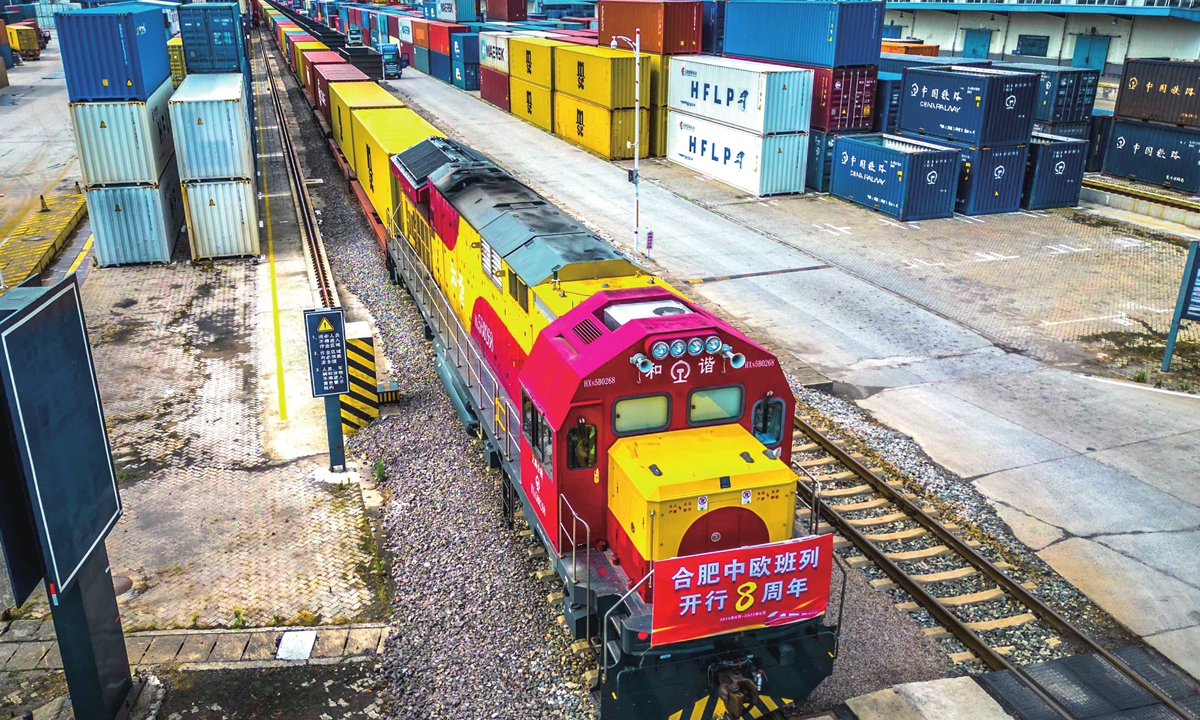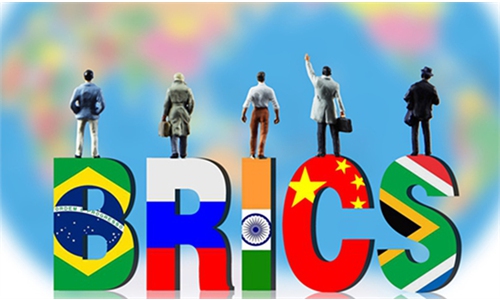Internal development of China lays foundation for global efforts: Swedish scholar

A China-Europe freight train departs from Hefei, Anhui Province on June 24, 2022. Photo: cnsphoto
Editor's Note:
For the Chinese people, the past decade was epic and inspirational. The country, under the leadership of the Communist Party of China with Xi Jinping at its core, has made great endeavors in boosting its economy, deepening reforms, improving the rights of its people and acting as a responsible power globally.
The Belt and Road Initiative which was put forward by President Xi in 2013, with 149 countries and 32 international organizations participating in it to date, has injected growing impetus and stability into global cooperation in a world of uncertainties. Stephen Brawer (Brawer), Chairman of the Belt and Road Institute in Sweden, in an interview with Global Times (GT) reporter Yu Jincui shared his views on how the initiative has boosted development of countries along the route, and also debunked Western attempt of demonizing the Belt and Road with false narratives such as "debt trap."
This is the 11th article of the series about this special decade.
GT: How do you evaluate China's development over the past 10 years, and what changes have impressed you the most?
Brawer: The internal developments of China are unique in human history. Over the last 10 years, in addition to launching the Belt and Road Initiative, which President Xi Jinping announced in 2013, there has been an incredible investment and development of infrastructure, which has raised China as an economic power worldwide, as well as the remarkable achievement of eradicating extreme poverty.
This is also a completely unique type of world development in terms of economic progress. China has primarily achieved this through an incredible development perspective in both modernizing and achieving major infrastructure projects, primarily the development of high-speed railway, which has changed the entire internal ability of China to both provide and transport economic goods internally.
But it is not limited to that. There has been a massive investment in eliminating pollution in terms of development of environmental factors, which has put China in a leading role in cooperating with West Europe as a whole. Sweden has obviously been very interested in collaborating with China on the improvement of green technology and environmental issues.
And beyond this, you have what President Xi has emphasized on, a commitment of the nation to innovation and technological improvement. And one can see that China has been in the forefront in terms of space development. There has been the first landing on the far side of the moon that was achieved by China. This has never been done by any other nation. You also have the development now of the Chinese space station. In addition, China has been reaching out not simply to maintaining its own internal developments, but through the combination of BRICS. There is an increasing emphasis on how to promote a development perspective that has been lacking, unfortunately, in the West under what has also been called the unipolar world.
So I think that the internal developments of China have laid the foundation for an incredible global effort, primarily through the Belt and Road, which can not only continue China's forward development, but also influence many of the other developing nations.
GT: What role do you think has the CPC played in China's development?
Brawer: I'm not an expert in internal Chinese political organization. However, it's very clear that there is a historical commitment in China to what I would call the common good. That is the policy which China has pursued as the People's Republic and a centralized form of decision-making in the government that has been a key factor in being able to shape and direct policymaking.
GT: In recent years, the West's narrative of the CPC has often avoided the positive role of the CPC in China's social progress and world economic development. Why can't the West face the CPC objectively?
Brawer: There is a very big problem in Western thinking, and it's extremely narrow-minded. There is not an ability to recognize in reality that China has become an enormous economic power in the world, and that in many ways it's directly related to China's political system. This narrowness in thinking in the West is preventing not only the West as a whole, but the populations of the West from recognizing and understanding the reality of what has occurred.
This is, in my view, a deeper problem. The reason for that is there is a refusal on the part of the West to accept the fact that there is a rising new world order, which is referred to many times as multicultural or multipolar. Their lack of willingness to actually situate China in any kind of positive, legitimate and realistic role in the present world history is quite arrogant.
GT: Your institute focuses on BRI studies. What do you think of the advancement and development of the BRI over the past nearly nine years? What changes has this initiative brought about?
Brawer: This has been the leading initiative in modern history to bring about a new global development order, which is fundamentally based on the same ideas that have allowed for the internal improvements of China itself. It is emphasizing the necessity of modernization of infrastructure in order to overcome poverty in all areas of the developing world, and that initiative, although it is unfortunately generally looked at in a very negative way or even rejected by the Swedish government at this particular time, represents a unique initiative that is open to global cooperation. Now I see no other positive initiative of the type as the Belt and Road Initiative. At this time, there is nothing that has shown itself to be functioning in the scope and in the direction that the Belt and Road Initiative has actually done.
The BRI is essential and unique at this particular point. I think that it's only to break through this kind of narrowness of thinking that is controlling the West that would open the door to collaboration and cooperation from the US, from Europe, from the EU, which is in the interests of all nations.
GT: Some Western media and analysts attributed debt problems in countries like Sri Lanka to China and claimed the BRI is a tool of "debt-trap diplomacy." How do you respond to such narratives?
Brawer: My colleague Hussein Askary, vice president of the Belt and Road Institute in Sweden, published an article on our website recently which specifically addresses the fraudulent nature of this attempt to characterize China as trying to manipulate and take over countries like Sri Lanka based on controlling the debt. I recommend people to read about it.
My colleague wrote an excellent article showing that the majority of debt that Sri Lanka owes, about 90 percent, is to the West. Exactly as in the case of Pakistan, China's share of the external public debt of Sri Lanka is only 10 percent. Western financial institutions hold the lion's share of the debt. It's those Western international speculators who have caused the enormous debt problems in Sri Lanka, and it is not in any way a result of China's involvement in investing in Sri Lanka.
So this debt trap narrative is a deliberately false narrative that has no substance. Noticeably, the debt trap narrative was not originally created by an economist, but some American "researchers" with background in security matters, who were commissioned by the US State Department to write a report "Debtbook Diplomacy" in 2018, and even stated that they would make Hambantota Port the "template" for this narrative. And that was launched precisely with the purpose of attempting to discredit or characterize in a completely false way what China's role has been and what the Belt and Road Initiative is really based on.
So when you check the facts - the facts are presented quite nicely in my colleague's article, one sees that there is no truth to the so-called debt trap. It is just propaganda that is being circulated by the West.
GT: The EU and the US in recent years have also come up with their global infrastructure plans, namely the Global Gateway and the Build Back Better World (B3W) initiatives. Both moves are viewed as attempts to rival the BRI. How will those plans affect the BRI? What do you think of the mindset of viewing the BRI in a zero-sum way?
Brawer: These initiatives have no substance. They are basically being propagated in the name of countering what they see is the growing influence of the BRI.
The BRI is actually built on the concept that nations accept voluntarily cooperation with China and want to be helped to develop their infrastructure. That has been shown to be a successful characterization of the developments in Ethiopia and the developments in Kenya with the building of rail systems. None of those things over decades have ever been even remotely considered by all of the so-called Western financial institutions or the initiatives that have come from the West. These Western initiatives, such as the Build Back Better World, have, in my view, nothing to offer in reality. They may attempt to throw some money with NGOs at the countries that they believe they have to prevent the BRI from taking form. But they are not based on true development perspective.
To be very frank, most of the countries in the developing world are aware of this. That is why you have nearly 150 countries joining the BRI. I don't know of any countries at the moment who have joined Build Back Better World.
GT: Has the EU fully tapped the potential of the BRI? In what ways can China and the EU deepen BRI cooperation?
Brawer: Despite a Western narrow-minded thinking and arrogance that is affecting the ability of cooperation, which otherwise could be expanded dramatically, there is increasing developments of trade that are going forward in light of the BRI. The BRI is not being stopped and it's going forward. But the question why the West is refusing to recognize that constitutes a serious problem. We have taken up the fact that the dramatic crisis that the world is facing right now in Ukraine could in fact have been and can be resolved if Ukraine would become the link or the bridge for economic development of China into Europe. But there is a faction in the West that does not want peace, and they do not want that cooperation.
So that's one of the characterizations of why the problem in Ukraine continues, and the people of Ukraine are suffering. The world is being put in a very, unfortunately, dangerous position, which could lead to an unnecessary global conflict.
Therefore, if Europe would embrace a much more open spirit of cooperation, which is what we advocate, as well as recognize the importance of trade in light of what the BRI offers, there will be no question that the difficulties that are even apparent in Sweden and in other European countries could be resolved in a very positive way. Hopefully that will begin to change. But for the moment, as I've already outlined, the think tanks and the politicians who have accepted an enemy image of China and also Russia at this point, are at the moment controlling the mass media in the West and making it very difficult for people in the West to actually understand what the BRI is and how it could be beneficial. However, we are working actively and will continue to do so in order to give the real picture and to engage those businesses and others who recognize the benefits of cooperation rather than confrontation.

